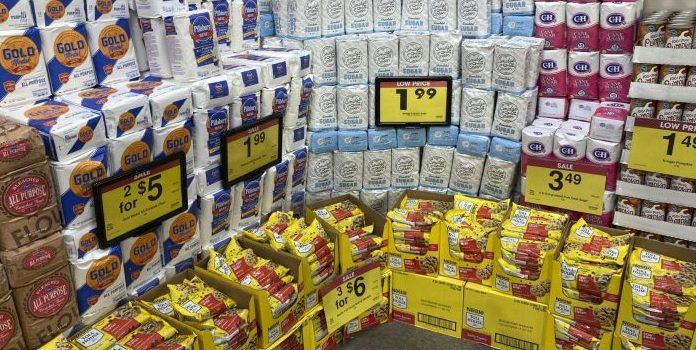(Headline USA) Inflation jumped in December at its fastest year-over-year pace in nearly four decades, surging 7% and raising costs for consumers and offsetting recent wage gains for those who remain employed.
The pandemic is global. But with few exceptions, this *level* of inflation is unique to the United States.
Joe Biden is directly responsible.
— Tom Cotton (@TomCottonAR) January 12, 2022
Growing public outrage was heightening pressure on President Joe Biden and the Federal Reserve—both of whom long denied the severity of the problem—to address what is increasingly Americans’ central economic concern.
The chief cause of inflation has been the ongoing creation of new money—in part due to the Fed’s economic stimulation and in part due to the Biden administration’s big-spending policies on the heels of several rounds of multi-trillion-dollar pandemic relief.
Biden’s hostile energy policies and other regulations also have driven up production and transport costs.
However, the Left continues to claim that economic indicators suggest a healthy and robust economy, and that prices have spiked only because Americans have ramped up spending on goods such as cars, furniture and appliances.
Democrats, meanwhile, have continued to incentivize unemployment—not only through overly generous welfare and social services subsidized by the US taxpayer, but also through the threat of authoritarian vaccine mandates for many who wish to remain in the workforce.
Clogged ports and warehouses and exacerbated supply-chain shortages of semiconductors and other parts.
The Labor Department reported Wednesday that excluding volatile food and gas prices, so-called core prices surged 0.6% from November to December, slightly more than the 0.5% increase from October to November. Measured year over year, core prices jumped 5.5% in December, the fastest such increase since 1991.
Rising prices have wiped out the healthy pay increases that many Americans have been receiving—although inflation itself may be causally related as annual cost of living adjustments place a more onerous burden on employers.
Used car costs rose 3.5% from November to December and have soared more than 37% compared with a year ago. With new car production restrained by shortages of semiconductors, consumers have snapped up used cars, forcing up their costs.
Shortages at U.S. grocery stores have also grown more acute in recent weeks as new problems, like the omicron variant and severe weather, have compounded the supply chain struggles and labor shortages that have plagued retailers since the coronavirus pandemic erupted.
On Tuesday, Fed Chair Jerome Powell told Congress that the Federal Reserve is prepared to accelerate the interest rate hikes it plans to begin this year if it deems it necessary to curb high inflation.
Fed officials have estimated that they will raise their benchmark short-term rate, now pegged near zero, three times this year. Many economists envision as many as four Fed rate hikes in 2022.
Those rate increases would likely increase borrowing costs for home and auto purchases, as well as for business loans, potentially slowing the economy.
The rate hikes also mark a sharp reversal in policy by Fed policymakers, who as recently as September had been split over whether to raise rates even once this year. The Fed is also rapidly ending its monthly bond purchases, which were intended to lower longer-term interest rates to encourage borrowing and spending.
Yet the Fed’s recent pivot hasn’t quelled questions from many former Fed officials, economists and some senators about whether the Fed has acted too slowly to end its ultra-low-interest rate policies in the face of accelerating inflation—and put the economy at risk as a result.
In his testimony to Congress on Tuesday, Powell said the Fed mistakenly believed that supply chain bottlenecks that have helped drive up the prices of goods wouldn’t last nearly as long as they have.
Powell dubiously claimed that once the supply chains were unsnarled, he said, prices would come back down. But the wage increases may, in fact, result in a more permanent addition to the consumer pain index, resulting in a vicious and unending cycle of price hikes, particularly as the Biden administration falls short on its trade deficit with other nations including China.
For now, the supply problems have persisted, and though there are signs that they are loosening in some industries, Powell acknowledged that progress has been limited. He noted that many cargo ships remain docked outside the port of Los Angeles and Long Beach, the nation’s largest, waiting to unload.
Biden has claimed his administration’s $2.5 trillion investment in infrastructure would help ease inflation by loosening some snarled supply chains, even though the bill also contained a significant amount of pork spending for Democrats that were likely to do more harm than good to the overall economy.
In the meantime, many restaurants have been passing some of their higher labor and food costs on to their customers in the form of higher prices.
Gene Lee, CEO of Darden Restaurants, which owns Olive Garden and other brands, told investors recently that this is “the toughest inflationary environment we’ve seen in years.”
The company said its food and beverage costs jumped 9% during the quarter, and its hourly wage costs rose nearly 9% as it raised pay to attract workers.
Darden said it raised its prices, in turn, by 2% during the quarter and expects to raise them by 4% over the next two quarters to help compensate. Rick Cardenas, the company’s president and chief operating officer, said those higher prices have yet to reduce consumer demand.
Adapted from reporting by the Associated Press

